Garden Maintenance in Stratford
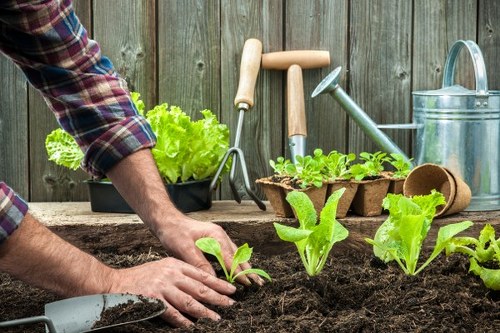
Introduction to Garden Maintenance
Maintaining a beautiful garden in Stratford requires dedication, knowledge, and the right set of tools. Whether you're a seasoned gardener or a novice, understanding the fundamentals of garden maintenance can transform your outdoor space into a vibrant and thriving oasis.
Garden maintenance involves a variety of tasks, from regular watering and weeding to more complex activities like pruning and soil health management. In Stratford, where the climate and soil conditions can vary, tailored maintenance practices are essential for ensuring your garden flourishes throughout the year.
In this comprehensive guide, we will explore the key aspects of garden maintenance in Stratford, providing you with actionable tips and strategies to keep your garden in top shape.
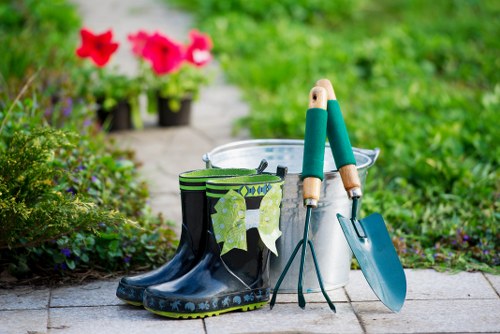
Seasonal Garden Care
Spring Maintenance
Spring is a critical time for garden maintenance in Stratford. As the weather warms up, plants begin to awaken from their winter dormancy, making it the perfect time to prepare your garden for the growing season.
Tasks to focus on during spring include:
- Soil Preparation: Test and amend the soil to ensure it has the right pH and nutrient levels.
- Planting: Sow seeds and plant new shrubs or trees.
- Pruning: Trim back any dead or damaged branches to encourage healthy growth.
Implementing these practices will set a solid foundation for a lush and productive garden.
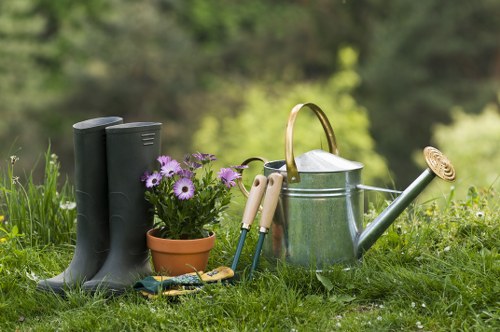
Summer Maintenance
Summer is the season when your garden reaches its peak, but it also demands consistent care to maintain its beauty.
Key summer maintenance tasks include:
- Regular Watering: Ensure plants receive sufficient water, especially during dry spells.
- Weed Control: Keep weeds at bay to prevent them from competing with your plants for nutrients.
- Pest Management: Monitor for pests and take appropriate measures to protect your plants.
By staying vigilant during the summer months, you can enjoy a vibrant and healthy garden all season long.
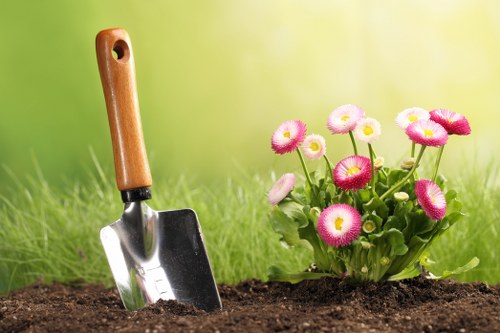
Soil Health and Fertilization
Understanding Soil Composition
Healthy soil is the backbone of any thriving garden. In Stratford, it's essential to understand the unique composition of your soil to provide the best care for your plants.
Components of healthy soil include:
- Organic Matter: Enhances soil structure and provides nutrients.
- Minerals: Offer essential nutrients like nitrogen, phosphorus, and potassium.
- Microorganisms: Play a vital role in nutrient cycling and soil health.
Regular soil testing can help you determine the specific needs of your garden and tailor your fertilization practices accordingly.
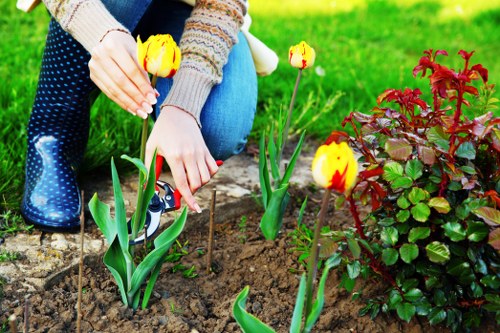
Pruning and Trimming Techniques
The Importance of Pruning
Pruning is a crucial aspect of garden maintenance that promotes healthy growth and enhances the aesthetic appeal of your plants.
Benefits of regular pruning include:
- Improved Plant Health: Removes diseased or damaged branches, reducing the risk of infestations.
- Enhanced Growth: Encourages the development of strong, healthy branches.
- Better Airflow: Increases air circulation, reducing the likelihood of fungal diseases.
Proper pruning techniques vary depending on the type of plant, so it's essential to research or consult with a gardening expert to achieve the best results.
Garden Tools and Equipment
Having the right tools is essential for efficient garden maintenance. In Stratford, investing in quality gardening equipment can make a significant difference in the upkeep of your garden.
Essential garden tools include:
- Pruners: For trimming and shaping plants.
- Rakes: To gather leaves and debris.
- Watering Systems: Ensures plants receive adequate moisture.
- Soil Test Kits: To monitor soil health and nutrient levels.
Maintaining your tools by cleaning and storing them properly will extend their lifespan and ensure they perform optimally.
Lawn Care in Your Garden
Mowing and Trimming
A well-maintained lawn is a cornerstone of garden aesthetics. Regular mowing and trimming help keep your grass healthy and visually appealing.
Tips for effective lawn care:
- Maintain Proper Mower Height: Cutting grass too short can stress the plants.
- Grasscycling: Leaving clippings on the lawn can return nutrients to the soil.
- Edge Regularly: Keeps the lawn looking neat and defined.
Additionally, overseeding can help fill in bare spots and promote a thick, lush lawn.
Water Management and Irrigation
Efficient water management is vital for sustaining a healthy garden, especially during Stratford's warm summers.
Strategies for effective irrigation include:
- Drip Irrigation: Delivers water directly to the plant roots, minimizing waste.
- Rainwater Harvesting: Collecting rainwater can reduce your reliance on municipal water sources.
- Smart Irrigation Systems: Automate watering based on weather conditions and soil moisture levels.
Proper watering practices not only conserve water but also ensure your plants receive the optimal amount of moisture for growth.
Pest and Disease Control
Identifying Common Garden Pests
Pests can pose a significant threat to your garden's health. Early identification and management are crucial to preventing extensive damage.
Common garden pests in Stratford include:
- Aphids: Small insects that suck sap from plants, causing deformation.
- Slugs and Snails: Feed on leaves and stems, particularly damaging young plants.
- Spider Mites: Cause stippling and discoloration on plant leaves.
Implementing integrated pest management (IPM) strategies can help control pest populations while minimizing environmental impact.
Plant Selection and Landscaping
Choosing the Right Plants
Selecting plants that are well-suited to Stratford's climate and soil conditions is essential for a successful garden.
Consider the following when choosing plants:
- Hardiness Zone: Ensure plants are suitable for Stratford's USDA hardiness zone.
- Soil Compatibility: Select plants that thrive in your garden's soil type.
- Water Requirements: Match plants to available water resources and irrigation capabilities.
Diversifying plant species can enhance biodiversity and create a more resilient garden ecosystem.
Organic Gardening Practices
Benefits of Going Organic
Adopting organic gardening practices can lead to a healthier environment and produce tastier, chemical-free plants.
Key organic gardening practices include:
- Composting: Recycles kitchen and garden waste into nutrient-rich compost for soil enrichment.
- Natural Pest Control: Uses beneficial insects and organic pesticides to manage pests.
- Mulching: Helps retain soil moisture and suppress weeds naturally.
Organic gardening not only benefits your plants but also contributes to the overall health of the local ecosystem in Stratford.
Professional Garden Maintenance Services
While DIY garden maintenance can be fulfilling, hiring professional services in Stratford can ensure your garden receives expert care.
Advantages of professional garden maintenance:
- Expertise: Professionals have the knowledge and experience to address complex gardening challenges.
- Time-Saving: Outsourcing maintenance tasks frees up your time for other activities.
- Customized Care: Services are tailored to meet the specific needs of your garden.
Consider partnering with a reputable garden maintenance company in Stratford to maintain the beauty and health of your outdoor space year-round.
Eco-Friendly Maintenance Tips
Sustainable Gardening Practices
Embracing eco-friendly maintenance practices can make your garden more sustainable and environmentally responsible.
Eco-friendly tips include:
- Use Native Plants: These plants are well-adapted to local conditions and require less maintenance.
- Reduce Chemical Use: Opt for natural fertilizers and pest control methods to minimize environmental impact.
- Conserve Water: Implement water-saving techniques like mulching and efficient irrigation systems.
Incorporating these practices not only benefits your garden but also contributes to the broader effort of environmental conservation in Stratford.
Garden Lighting and Decoration
Enhancing Your Garden with Lighting
Proper lighting can transform your garden into a magical space, extending its usability into the evening hours.
Ideas for garden lighting:
- Pathway Lights: Illuminate walkways for safety and aesthetic appeal.
- Spotlights: Highlight key garden features like trees or sculptures.
- String Lights: Add a whimsical touch to seating areas and patios.
Choosing energy-efficient lighting options can reduce electricity costs and minimize the environmental footprint of your garden.
Maintaining Garden Structures
Garden structures such as pergolas, trellises, and fences require regular maintenance to ensure their longevity and functionality.
Maintenance tips for garden structures:
- Regular Cleaning: Remove dirt, debris, and plant material to prevent decay.
- Inspect for Damage: Check for broken or weak parts and repair them promptly.
- Protect Against Weather: Apply sealants or paints to shield structures from harsh weather conditions.
Well-maintained structures enhance the overall look of your garden and provide essential support for various plants.
Conclusion
Effective garden maintenance in Stratford involves a combination of regular care, informed practices, and, when needed, professional assistance. By following the guidelines outlined in this article, you can cultivate a beautiful, healthy, and sustainable garden that brings joy and relaxation throughout the year.
Whether you're embarking on a new gardening journey or looking to enhance your existing garden, understanding the unique aspects of Stratford's gardening environment will equip you with the tools needed for success.
Ready to transform your garden? Contact us today to schedule your garden maintenance service and take the first step towards a stunning outdoor space.

